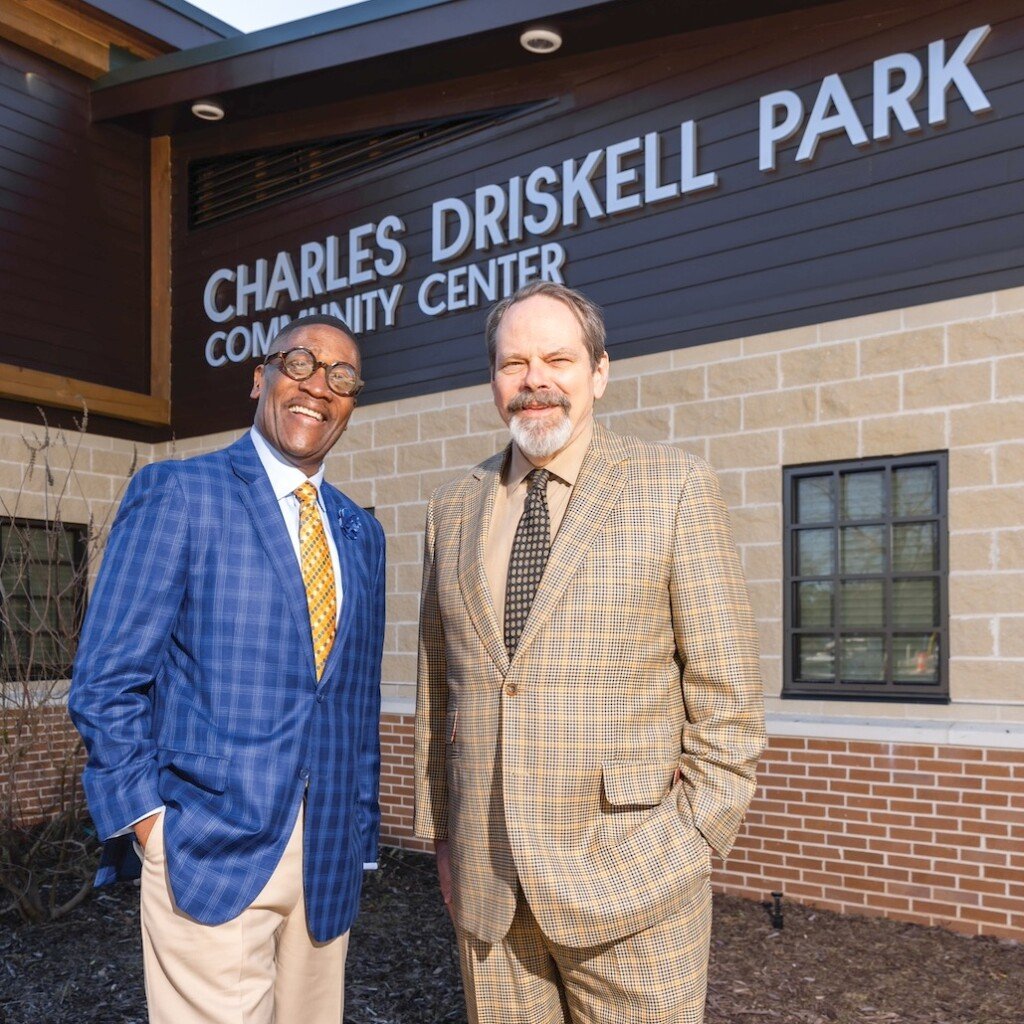Made in Georgia: Manufacturing Excellence
Georgia Made companies are making their mark on the state.
Georgia is well known for a variety of different businesses and industries, like agriculture – which produces our famous Georgia peaches, pecans and peanuts – and entertainment, which has led to the nickname “Hollywood of the South.” The state is home to 18 Fortune 500 companies and 37 Fortune 1000 companies, including iconic brands such as The Coca-Cola Company, Delta Air Lines and The Home Depot.

Elevated Profile: Rob Harris, senior director of optical manufacturing for EssilorLuxottica. Photo credit: Kevin Garrett
The state also boasts a vibrant manufacturing sector. Manufacturing facilities in Georgia generated more than $79 billion and employed more than 430,000 people in 2023, according to 2024 JobsEQ data. Manufacturers accounted for 8.27% of the state’s workforce as of the second quarter of 2024.
To recognize the impact of manufacturing, the legislature created the Georgia Made branding program. It’s similar to Georgia Grown, a branding effort that highlights food and agricultural products produced in the state.
“Georgia Made was established by the General Assembly to further support and highlight Georgia’s existing industries that are manufacturing everyday products in Georgia,” says Lindsay Martin, who oversees the program in his role as the director of small business, Georgia Made and GRAD Certification for the Georgia Department of Economic Development (GDEcD).
“Georgia Made companies come in all shapes and sizes from every corner of the state,” he says.
While diverse in size and scope, what these companies seem to have in common is that they contribute to the state in a number of ways, while creating products that impact the lives of people in Georgia and beyond.
Martin says state leadership strongly endorses the Georgia Made program – and with good reason. Manufacturing is a key industry for Georgia. With an estimated more than 7,000 manufacturing facilities statewide, it makes up nearly 10% of the state’s gross domestic product. The Georgia Made certification showcases goods and products produced at selected facilities.
One of the state’s more prominent companies is also one of the most recent to join the Georgia Made program. Hyundai Motor Group Metaplant America became Georgia Made certified in February 2025.
“HMGMA takes great pride in being part of the Georgia Made family, where we are dedicated to building electrified vehicles right here in the Peach State. By proudly displaying the Georgia Made logo, we reaffirm our commitment to Georgia and its economic vitality. We’re creating high-quality jobs, strengthening communities and driving the future of mobility,” says Brent Stubbs, chief administrative officer at the metaplant.

Highlighting Industry: Lindsay Martin, director of small business, GRAD certification and Georgia Made at the Georgia Department of Economic Development. Photo Ben Collins
While Hyundai is new to the program, Hurst Boiler & Welding Company in Thomas County was one of the first manufacturers to receive the Georgia Made certification in 2020. “We’re really proud of this,” says Chad Fletcher, director of purchasing and aftermarket sales. “We put the Georgia Made sticker right next to a Made in the USA sticker on all the boilers we manufacture.”
Hurst has been an American manufacturer of industrial boilers for companies worldwide since 1967. In 2007, it completed a large expansion that doubled its manufacturing space to 350,000 square feet on a campus of more than 48 acres in Coolidge.
“Georgia Made companies come in all shapes and sizes from every corner of the state.” Lindsay Martin, director of small business, GRAD certification and Georgia Made, Georgia Department of Economic Development
“This is a great location for us,” says Fletcher. And it’s also great for Coolidge, where it employs 250 people. That’s significant in a town with a population of just 529, according to U.S. Census figures.
Hurst’s headquarters may be in a small town, but its reach is rather large, with markets encompassing every continent except Antarctica, so access to the Georgia ports in Savannah and Brunswick is critical.
Finding and Recruiting Workers
A skilled workforce is also crucial, so Hurst recruits employees from nearby universities like Southern Regional Technical College, which has a campus less than 20 minutes away in Thomasville. When Hurst hires its graduates, it is both a win for alumni wanting to stay in the area and a win for the company.

Broad Reach: Chad Fletcher, director of purchasing and aftermarket sales, at Hurst Boiler & Welding Company in Thomas County. Photo credit: David Parks
While Hurst proudly displays the Georgia Made label, that label isn’t always visible to consumers because it doesn’t fit on the product. EssilorLuxottica, for example, manufactures lenses and distributes prescription eyeglasses and sunglasses at its 1,700-employee manufacturing plant in McDonough.
“We don’t have the ability to put Georgia Made on the products themselves, but we absolutely use that designation as a selling point when we’re talking to potential suppliers and employees,” says Rob Harris, senior director of optical manufacturing for EssilorLuxottica. “The designation has elevated our profile as a leader in manufacturing and strengthened our connection to the local community.”
Georgia Made can bolster a company’s visibility within its community as it signals to residents, including potential employees, that it proudly supports jobs in the area. Harris says applying for the Georgia Made designation was a natural step to recognizing EssilorLuxottica’s commitment to manufacturing excellence in the state, saying it aligns with the company’s values of fostering innovation, creativity and quality products and helps attract talent to the manufacturing facility.
Some of that talent can be found at nearby Gordon State College at McDonough, Clayton State University in Morrow and Southern Crescent Technical College, which has locations in Henry, Fayette, Griffin, Upson and Butts counties. Georgia companies like EssilorLuxottica benefit from alignment with the Technical College System of Georgia and its workforce training initiatives, including Georgia Quick Start, to support their growth.
Another Georgia Made company, Kubota Manufacturing of America Corp., uses multiple programs associated with TCSG to bolster its workforce. “Georgia is home for us, and we’re well-known in our local community as a Georgia Made business,” says Ryan Owen, vice president of human resources, facilities, quality, safety and environmental at Kubota.
The company has been building tractors, mowers and utility vehicles on a 180-acre campus in Gainesville since 1988. “We’ve grown tremendously since then,” says Owen, expanding four times since 2003 and now employing 3,100 workers across three campuses in Hall County. The company’s research and development facility is also in Gainesville, and its Kubota Industrial Equipment subsidiary has operated large manufacturing and distribution facilities in Jackson County since 2005.
Kubota relies heavily on a skilled workforce that can adapt to automation and other technology advancements. One way it finds eligible employees is through Georgia Quick Start, a company-specific workforce development program that helps train employees for high-tech jobs. Eligible companies can partner with the Quick Start program to develop customized workforce training, according to GDEcD Chief Operating Officer Sydne Smith. “Many manufacturers have benefitted from this perk.”

Skilled Workforce: Kubota Manufacturing of America Corp. builds tractors, mowers and ulility vehicles in Hall County, employing 3,100 people. Photo credit: Kevin Garrett
Also key to building a workforce is GEORGIA MATCH, a program that informs high school seniors which schools would admit them if they applied. It’s especially useful to students who might not have considered higher education, but rethink that after receiving a letter matching them with certain schools. “This program bolsters the state’s already impressive technical college and university programs by encouraging Georgians to upskill or continue their education,” Smith says, adding that technical colleges tailor their program offerings to reflect the local industry mix and work with local industry to place graduates where they’re needed.
“It’s one thing to say your products are American made, but it’s something else for us to be able to say ours are Georgia Made. We all take a lot of pride in that.” Luther Ingram, president and executive director, Roper
Kubota understands the importance of technical colleges and works to strengthen relationships with them. In 2018, its manufacturing plant in Gainesville and industrial equipment facility in Jefferson together donated $1 million to the Lanier Technical College Foundation. Lanier Tech has campuses in both Hall and Jackson counties as well locations in Forsyth, Barrow and Dawson. The money went toward the purchase of state-of-the-art equipment in the college’s technical and industrial building, located about one mile from the Kubota plant in Gainesville.
A Century of Manufacturing in Georgia

Economic Vitality: Maria Gallahue-Worl, CEO of TenCate Protective Fabrics. Photo credit: contributed
TenCate Protective Fabrics, which is celebrating its 100-year anniversary as a Georgia manufacturer this year, also benefits from having colleges like Atlanta Technical College, Clark Atlanta University and Georgia State University less than 20 miles away from its headquarters. The Dutch-owned manufacturer produces flame-resistant textiles used in clothing and gear worn by firefighters, military personnel and industrial safety professionals.
Originally founded in 1925 as Southern Mills, based in Union City, it was acquired by TenCate Protective Fabrics in 2004. The company, which received the Georgia Made certification in 2024, employs 381 workers at four separate manufacturing facilities in Senoia, Zebulon and Molena and its corporate office and lab in Union City.
CEO Maria Gallahue-Worl says the Georgia Made certification is very important. “We play a big role in the economic vitality of these areas,” she says. “In return, many of our employees have been very loyal to us.” For example, many multi-generational employees have been with the company for more than 30 years.
Fabrics manufactured by TenCate are used by local fire departments in Macon, Cobb County, Gwinnett County and Coweta County, as well as fire departments across the country, including the Fire Department of New York. “The gear that firefighters and soldiers wear isn’t just something they throw on,” says Gallahue-Worl. “It’s critical to performing their jobs and keeping them safe.”
Help from Apprenticeships

Delivering Goods: Luther Ingram, president and executive director at Roper. Photo credit: contributed
Roper Corp., which has had its Georgia Made certification since 2020, takes advantage of TCSG apprenticeship programs to train and retain qualified employees. The company, a wholly owned subsidiary of GE Appliances (GEA), manufactures cooktops, freestanding ranges and wall ovens at its 2,500-employee facility in LaFayette. Since 2016, GEA has invested $161 million and created 700 new jobs in Walker County.
In 2023, Roper celebrated its 50-year anniversary in Georgia by showcasing some of the upgrades it made with a $118 million investment to expand its manufacturing capabilities. It unveiled assembly lines that feature the latest advanced manufacturing technology to build new models of freestanding ranges, which became available in 2024. The expansion more than tripled the robotics used in the factory, improving efficiency and ergonomics for employees.
The state of Georgia gave grant money to the plant to fund an existing apprenticeship program with Georgia Northwestern Technical College (GNTC) that trained 45 employees in robotics to prepare for the launch. The apprenticeship program started in 2017 with Roper sending workers to train in GNTC’s mechatronics program at its Catoosa County campus. The goal of such programs is to strengthen its internal pipeline of talent by preparing new and incumbent employees for more highly skilled positions.

Protecting Frontline Workers: An employee on the job at TenCate Protective Fabrics, which produces flame-resistant textiles used in clothing worn by firefighters, military personnel and industrial safety professionals. Photo contributed
And as they learn more skills and rise through the ranks, employees can better appreciate their role in the company and the company’s role in the state. “There’s a lot of pride among our employees in knowing that they’re helping deliver appliances made right here in Georgia to consumers across the country,” says Luther Ingram, president and executive director at Roper. More than 50% of all homes in the U.S. have at least one GE appliances, and many of them are made at the LaFayette manufacturing plant.
“It’s one thing to say your products are American made, but it’s something else for us to be able to say ours are Georgia Made,” says Ingram. “We all take a lot of pride in that.”








